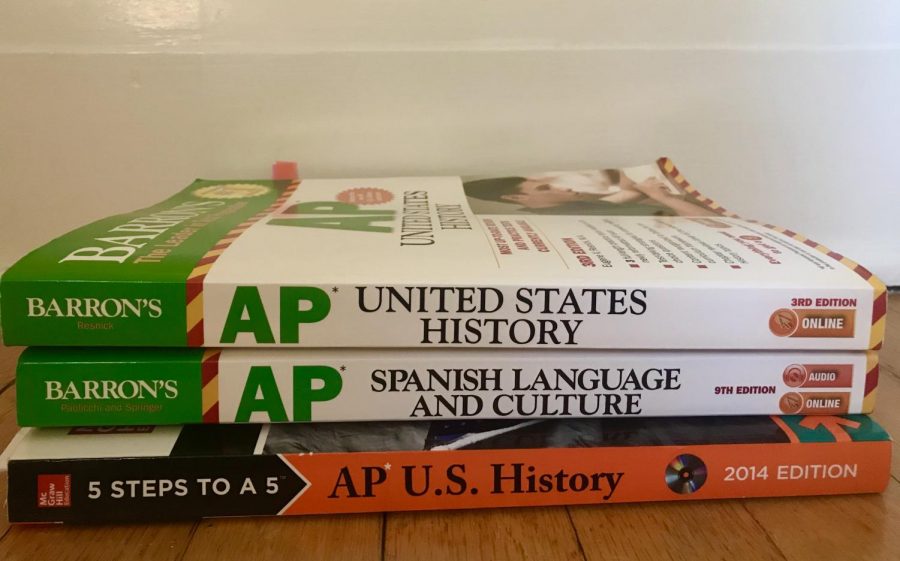Dear College Board: Do Better
Photo Caroline Collins
AP review books
For millions of students around the country, the culmination of a student’s learning is put to the test in May during the infamous three hour AP exam. However, due to the coronavirus, regular AP testing has been put on hold, and a 45-minute free-response, at-home exam is now the determining factor of a student’s hard work.
When I first heard that the AP exam would be administered at home, I was shocked at the news, but glad to still have the opportunity to take the test. Yet, as my exam date neared, I grew nervous. I was anxious about studying and taking the exam, and when I took to social media the week of my test date, my worries intensified. What I saw online was heartbreaking: students crying over exams that they were unable to submit and sharing their frustrations about the test. On social media, angry students were requesting that the College Board allow them to re-submit their exams.
On May 15, the day of my AP U.S. History exam, I was extremely nervous. Not only because of the task at hand, but because I was afraid that I, too, would be unsuccessful in submitting my exam. However, to my luck, I submitted my exam without any problems.
Afterwards, I went on social media, curious about whether students had difficulties with their exam. Once again I saw that students had problems with their submissions. I began to think: how could I have been so lucky to have my exam submitted while other students had not? Furthermore, what was the College Board doing to address such issues?
Last week the College Board said that less than 1 percent of 2.186 million tests taken in the first week have had issues with submissions. To put that into perspective, just 0.5 percent is 10,930 students. While 0.5 percent is just a small part of the total, the fact that even this many students were unsuccessful in submitting their tests is significant. If I were one of these students, I would be very upset.
Last week, in response to submission failures, the College Board only offered one solution: taking the makeup test in June. This meant that students would have to continue to study for their makeup test alongside preparing for their other AP exams.
Then, on May 17, the College Board announced that if during the second week of testing students were still having trouble submitting, they would be allowed to submit their response through email. The email option would also be available during the makeup test.
This is no doubt a reliable solution to submission problems, but where was this last week? Why did the College Board wait so long to make this decision? On May 11, Trevor Packer, the senior vice president of the AP administration, tweeted that of approximately 50,000 students that took the AP Physics C exam, around 2 percent had trouble with submissions. That’s roughly 1,000 students who had trouble on just the first day the AP tests were being administered. If there was a problem on the first day, there should have been an immediate remedy instead of letting more students suffer and struggle throughout the rest of the week.
The College Board and the AP administration have to do better. The remedy to the submission problem came far too slowly, and if the College Board would have acted faster, such frustration could have been avoided. This $94 exam determines whether a student can carry over college credit, affects their future college admissions, and is something that students have been studying for since September. These exams are important, and when this problem arose, there should have been an immediate response from the College Board.
Students’ futures are on the line, and the College Board should have been more cognizant of this fact when dealing with problems regarding the AP exam.

